AP Board 10th Class English 8th Lesson Sermon at Benares Important Questions and Answers
Study Skills
I. Read the pie chart carefully
 Now, answer the following Questions
Now, answer the following Questions
Question1).
What percentage of total expenses does employee salaries represent?
Answer:
25%
Question2).
How much of the total expenses is spent on marketing/advertising?
Answer:
5%
Question3).
Which expense category accounts for the smallest portion of the total expenses? (A)
- Marketing/Advertising
- Inventory/Supplies
- Rent
Answer:
- Marketing/Advertising
Question4).
If the total monthly expenses are $10,000, how much is spent on utilities? (B)
- $1500
- $2000
- $2500
Answer:
B) $2000
Question5).
What is the combined percentage of expenses for inventory/supplies and miscellaneous items? ©
- 10%
- 15%
- 20%
Answer:
- 20%
II. Read the bar chart carefully
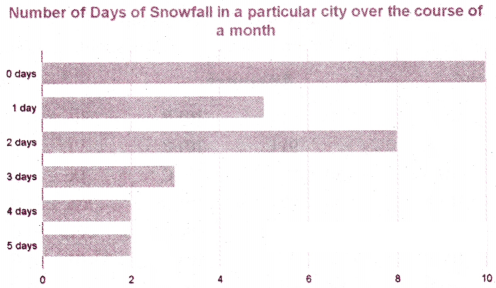 Now, answer the following Questions
Now, answer the following Questions
Question1).
How many days experienced 3 days of snowfall?
Answer:
3 days
Question2).
What is the total number of days observed for snowfall?
Answer:
30 days (10 + 5 + 8 + 3 + 2 + 2)
Question3).
Which number of days of snowfall occurred the most? (A)
- 0 days
- 1 day
- 2 days
Answer:
- 0 days
Question4).
How many more days experienced 2 days of snowfall than 4 days? (B)
- 4
- 6
- 5
Answer:
- 6
Question5).
How many days experienced at least 1 day of snowfall? (B)
- 25
- 20
- 15
Answer:
- 20
III. Read the pie chart carefully
 Now, answer the following Questions
Now, answer the following Questions
Question1).
What percentage of the total income is earned from online courses?
Answer:
20%
Question2).
How much of the total income is generated from affiliate marketing?
Answer:
5%
Question3).
Which income source contributes the least to the total income? (B)
- Freelance Platforms
- Affiliate Marketing
- Online Courses
Answer:
- Affiliate Marketing
Question4).
If the total monthly income is $5000, how much is earned from client projects? (B)
- $2500
- $3000
- $3500
Answer:
- $3000
Question5).
What is the combined percentage of income earned from freelance platforms and online courses? ©
- 15%
- 20%
- 35%
Answer:
- 35%
IV. Study the following table carefully
Number of Goals Scored by Different Football Players in a League
| Player |
Goals Scored |
| Ronaldo |
30 |
| Messi |
28 |
| Salah |
25 |
| Lewandowski |
32 |
| Mbappe |
27 |
Now, answer the following Questions
Question1).
Who scored the most goals in the season?
Answer:
Lewandowski
Question2).
How many goals did Mbappe score?
Answer:
27
Question3).
Who scored the least number of goals? ©
- Ronaldo
- Messi
- Salah
Answer:
- Salah
Question4).
What was the total number of goals scored by all players? ©
- 140
- 1400
- 142
Answer:
- 142
Question5).
Who scored more goals, Messi or Salah? (A)
- Messi
- Salah
- Both scored the same number of goals
Answer:
- Messi
V. Read the bar chart carefully
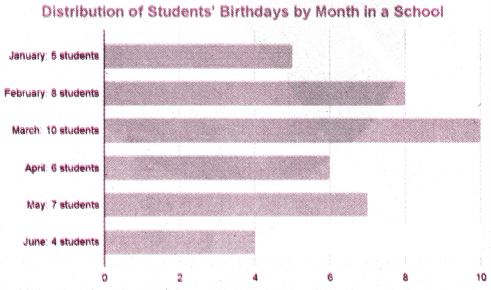 Now, answer the following Questions
Now, answer the following Questions
Question1).
How many students have birthdays in June?
Answer:
4 students
Question2).
What is the total number of students whose birthdays are recorded?
Answer:
40 students (5 + 8+10 + 6 + 7 + 4)
Question3).
In which month do most students have their birthdays? (B)
- February
- March
- April
Answer:
- March
Question4).
How many more students have birthdays in March than in May? (B)
- 2
- 3
- 4
Answer:
- 3
Question5).
How many students have birthdays in January and April? (A)
- 11
- 10
- 12
Answer:
- 11
SECTION - B
GRAMMAR VOCABULARY
Combining Sentences Using who/which/that, etc
Exercise -1
Question1.
The scientist discovered a new species. She works at the research institute. (Combine the sentences using who)?
Answer:
The scientist who works at the research institute discovered a new species
Question2.
My brother is a skilled mechanic. He fixed my car last week. (Combine the sentences using who)?
Answer:
My brother, who fixed my car last week, is a skilled mechanic
Question3.
The teacher gave us a challenging assignment. She expects us to complete it by Friday. (Combine the sentences using who)?
Answer:
The teacher who gave us a challenging assignment expects us to complete it by Friday
Question4.
The house has a beautiful garden. It is located in the countryside. (Combine the sentences using which)?
Answer:
The house, which is located in the countryside, has a beautiful garden
Question5.
The smartphone has a long battery life. It was released last month. (Combine the sentences using which)?
Answer:
The smartphone, which was released last month, has a long battery life
Question6.
The movie received mixed reviews. I watched it last night. (Combine the sentences using that)?
Answer:
The movie that I watched last night received mixed reviews
Question7.
The dog is very friendly. It greeted me at the door. (Combine the sentences using that)?
Answer:
The dog that greeted me at the door is very friendly
Question8.
I met a lawyer. I consulted her about my legal issues. (Combine the sentences using whom)?
Answer:
I met a lawyer whom I consulted about my legal issues
Question9.
We hired a new secretary. I interviewed her last week. (Combine the sentences using whom)?
Answer:
We hired a new secretary whom I interviewed last week
Question10.
He introduced me to his sister. I have heard a lot about her. (Combine the sentences using whom)?
Answer:
He introduced me to his sister whom I have heard a lot about
Exercise - 2
Question1.
The CEO of the company is retiring. She has been with the company for thirty years. (Combine the sentences using who)?
Answer:
The CEO who has been with the company for thirty years is retiring
Question2.
The firefighter rescued the cat from the burning building. He received a bravery award. (Combine the sentences using who)?
Answer:
The firefighter who rescued the cat from the burning building received a bravery award
Question3.
I visited a museum. It displayed ancient artifacts. (Combine the sentences using that)?
Answer:
I visited a museum that displayed ancient artifacts
Question4.
The dress is made of silk. It is very expensive. (Combine the sentences using that)?
Answer:
The dress that is made of silk is very expensive
Question5.
The restaurant serves delicious sushi. It is always crowded on weekends. (Combine the sentences using which)?
Answer:
The restaurant, which is always crowded on weekends, serves delicious sushi
Question6.
The project is due next week. I havent started working on it yet. (Combine the sentences using that)?
Answer:
The project that I havent started working on yet is due next week
Question7.
The book is on the shelf. I borrowed it from the library. (Combine the sentences using that)?
Answer:
The book that I borrowed from the library is on the shelf
Question8.
The computer crashed during the presentation. I was using it at the time. (Combine the sentences using that)?
Answer:
The computer that I was using at the time crashed during the presentation
Question9.
This is a famous engineering college. I joined engineering in it. (Combine the sentences using which)?
Answer:
This is a famous engineering college in which I joined engineering
Question10.
I have a friend. I admire her dedication to her studies. (Combine the sentences using whom)?
Answer:
I have a friend whom I admire for her dedication to her studies
Voice
Change the following sentences into passive voice.
Exercise - 1
Question1.
The kids planted trees in the park?
Answer:
Trees were planted in the park by the kids
Question2.
The teacher explained the lesson to the students?
Answer:
The lesson was explained to the students by the teacher
Question3.
Mary wrote a letter to her grandmother?
Answer:
A letter was written to her grandmother by Mary
Question4.
The chef prepared sushi for the customers?
Answer:
Sushi was prepared for the customers by the chef
Question5.
The construction workers built a new skyscraper downtown?
Answer:
A new skyscraper downtown was built by the construction workers
Question6.
The librarian organized the books on the shelves?
Answer:
The books on the shelves were organized by the librarian
Question7.
James fixed the broken window in the living room?
Answer:
The broken window was fixed by James in the living room
Question8.
The doctor examined the patients symptoms carefully?
Answer:
The patients symptoms were examined carefully by the doctor
Question9.
The band playetf music at the school assembly?
Answer:
Music was played at the school assembly by the band
Question10.
The janitor cleaned the hallways after school?
Answer:
The hallways were cleaned after school by the janitor
Exercise - 2
Question1.
I cannot understand his attitude?
Answer:
His attitude cannot be understood
Question2.
We nurture the children to build up a bright future?
Answer:
The children are nurtured to build up a bright future
Question3.
I am managing the duties at the office as well as home.?
Answer:
The duties are being managed at the office as will as home
Question4.
Let us recultivate the land?
Answer:
Let the land be recultivated
Question5.
The government is providing the illiterate people with necessary educational amenities?
Answer:
The illiterate people are being provided with necessary educational amenities by the government
Question6.
Have you ever used your common sense?
Answer:
Has your common sense ever been used
Question7.
Our efforts will inspire the people for successful growth?
Answer:
The people will be inspired by our efforts for successful growth
Question8.
Someone created the trouble?
Answer:
The trouble was created
Question9.
Can you lift this sack of rice?
Answer:
Can this sack of rice be lifted by you
Question10.
Every student has expressed willingness to join the group?
Answer:
Willingness to join the group has been expressed by every student
Combining the Sentences Using Linkers
Exercise -1
Question1.
He was exhausted. He couldnt concentrate on his work. (Combine the sentences using because)?
Answer:
He couldnt concentrate on his work because he was exhausted
Question2.
She was afraid. She didnt want to go alone. (Combine the sentences using as)?
Answer:
She didnt want to go alone as she was afraid
Question3.
The restaurant was crowded. We couldnt find a table. (Combine the sentences using because)?
Answer:
We couldnt find a table because the restaurant was crowded
Question4.
The box was very heavy. He could not lift it.(Combine the sentences using so. that)?
Answer:
The box was so heavy that he could not lift it.
Question5.
He was very busy. He managed to finish the project. (Combine the sentences using although)?
Answer:
Although he was very busy, he managed to finish the project
Question6.
She was determined. She achieved her goal. (Combine the sentences using because)?
Answer:
She achieved her goal because she was determined
Question7.
The traffic was heavy. We arrived late at the party. (Combine the sentences using when)?
Answer:
We arrived late at the party when the traffic was heavy.
Question8.
He was unwell. He still went to the meeting.(Combine the sentences using although)?
Answer:
Although he was unwell, he still went to the meeting
Question9.
The hike was challenging. They reached the summit. (Combine the sentences using despite)?
Answer:
They reached the summit despite the challenging hike
Question10.
She was excited. She couldnt sleep all night. (Combine the sentences using because)?
Answer:
She couldnt sleep all night because she was excited
Exercise - 2
Question1.
She was late. She missed the bus. (Combine the sentences using,because)?
Answer:
She missed the bus because she was late
Question2.
He was feeling unwell. He went to see the doctor. (Combine the sentences using as)?
Answer:
He went to see the doctor as he was feeling unwell
Question3.
He was hungry. He decided to order pizza. (Combine the sentences using because)?
Answer:
He decided to order pizza because he was hungry
Question4.
The dog was hungry. It finished its food quickly. (Combine the sentences using because)?
Answer:
The dog finished its food quickly because it was hungry
Question5.
He was angry. He didnt speak to anyone. (Combine the sentences using as)?
Answer:
As he was angry, he didnt speak to anyone
Question6.
The water was cold. They went swimming anyway. (Combine the sentences using although)?
Answer:
They went swimming anyway although the water was cold
Question7.
She was exhausted. She couldnt keep her eyes open. (Combine the sentences using because)?
Answer:
She couldnt keep her eyes open because she was exhausted
Question8.
The movie was boring. They left halfway through. (Combine the sentences using because)?
Answer:
They left halfway through the movie because it was boring
Question9.
The weather was pleasant. They went for a picnic. (Combine the sentences using because)?
Answer:
They went for a picnic because the weather was pleasant
Question10.
He was excited. He couldnt sit still. (Combine the sentences using because)?
Answer:
He couldnt sit still because he was excited
Suitable Prepositions
Fill in the blanks with suitable prepositions given in brackets
Question1.Exercise ?
- The project was completed successfully _____ the teams collaborative efforts. (in front of / because of / on behalf of)
- _____ the new regulations, employees need to undergo additional training. (In spite of / According to / For the sake of)
- She volunteered at the shelter _____ her love for animals. (by means of / due to / in addition to)
- He attended the meeting _____ his boss who was out of town. (in front of / on behalf of / because of)
- _____ the holiday season, the store extended its hours. (Because of / In addition to / According to)
- The message was conveyed to the team _____ email. (by means of / in spite of / for the sake of)
- She made the decision to move _____ her career prospects. (in front of / because of / for the sake of)
- The event was cancelled _____ the lack of participants. (in front of / because of / according to)
- He completed the assignment successfully _____ the detailed instructions. (in spite of / by means of / in addition to)
- _____ the recent storm, the power outage lasted for hours. (Due to / On behalf of / According to) %
Answer:
- because of
- According to
- in addition to
- on behalf of
- Because of
- by means of
- for the sake of
- because of
- by means of
- Due to
Question2.Exercise ?
- The flowers are _____ the vase. (in / on / at)
- She sat _____ the chair. (in / on / at)
- The spider crawled _____ the ceiling. (in / on / at)
- The book is _____ the shelf. (in / on / at)
- The picture hangs _____ the wall. (in / on / at)
- The keys are _____ the bag. (in / on / at)
- Well meet you _____ the station. (in / on / at)
- The hall rolled _____ the stairs. (in / on / at)
- The plane flew _____ the clouds. (in / on / at)
- The dog ran _____ the vard. (in / on / at)
Answer:
- in
- on
- on
- in
- on
- in
- at
- on
- in
- in
Suitable Forms of the Verbs
Fill in the blanks in the following sentences using correct forms of the verbs given in brackets
Question1.Exercise ?
- If I ______ (have) more time, I would travel around the world
- She would buy the house if she ______ (have) enough money
- If it ______ (rain) tomorrow, we will stay indoors
- I ______ (visit) my grandparents if I had a car
- If he ______ (study) harder, he would pass the exam
- We would go to the beach if it ______ (be) sunny
- If I ______ (be) you, I would take the job offer
- She would be happier if she ______ (live) closer to her family
- If they ______ (know) about the party, they would come
- If I ______ (be) taller, I could reach the top shelf
Answer:
- had
- had
- rains
- would visit
- studied
- were
- were
- lived
- knew
- were
Question2.Exercise ?
- Have you finished your work
Yes, I ______ (finish) my work
- Wilson ______ (begin) travelling the world in 2008v
- I ______ (know) her for nearly four years
- If I ______ (be) the Prime Minister, I would provide free education at all levels
- Its time Vyshnavi ______ (go) to bed
- I ______ (know) her for nearly four years
- He ______ (pass) his examination in 2016
- I ______ (see) Raju this week
- I ______ (lose) my pencil yesterday
- I ______ (know) her for nearly four years
Answer:
- have finished
- began
- have known
- were
- went
- have known
- passed
- have seen
- lost
- have known
Giving a Suitable Advice or Suggestion
Exercise - 1
Question1.
Your friend is going to visit Kerala. Advise him to learn a few words of Malayalam before he goes?
Answer:
You had better learn a few words of Malayalam
Question2.
Your friend has eyesight problem. Advise him to see a doctor?
Answer:
You should consult an ophthalmologist
Question3.
Your friend has lost his money in the beach. Advise him not to carry more money in open places?
Answer:
You had better not to carry more money in open places
Question4.
Your friend has been wasting money on expensive clothes. Advise her to be more careful with her money?
Answer:
It would be wise on your part not to waste your money on expensive clothes
Question5.
Your friend is feeling sick. Advise him to see a doctor?
Answer:
It would be better for you to see a doctor
Question6.
Your friend appears to be a good runner. Advise him to join a sports school?
Answer:
You should join a sports school
Question7.
Your friend who rides a motorcycle doesnt use a helmet. Advise him to use a helmet?
Answer:
It would be better for you to use a helmet
Question8.
A teacher has assigned a task in English to your friend which, he thinks, is very difficult. Advise him to try it?
Answer:
You should try it
Question9.
Your friend is neglecting studies. Suggest him/her to work hard for better results?
Answer:
You could wofk hard for better results
Question10.
Your cousin is very selfish. Suggest him/her to change his/her mindset?
Answer:
You could change your mindset
Exercise - 2
Question1.
Your friend is fat. Advise him to walk every morning?
Answer:
You should take a walk every morning
Question2.
Your neighbour is watching TV at high volume. How do you ask him/her to reduce the volume in a polite way?
Answer:
Would you kindly reduce the volume of your TV
Question3.
Your friend appears to be a good runner. Advise him to join a sports school?
Answer:
You should join a sports school
Question4.
Your friend is not speaking in English. Advise him/her to speak in English?
Answer:
You should speak in English
Question5.
Your brother who rides a motor-cycle does not use a helmet. Advise him to use a helmet?
Answer:
It would be better for you to use a helmet
Question6.
You want your friend to post a letter for you. How would you ask in a polite way?
Answer:
Would you mind posting this letter for me
Question7.
Your cousin is rather fat and wants to lose weight. Advise him to exercise every day?
Answer:
You ought to exercise every day
Question8.
Your friend has been losing weight recently. Tell her that she should see a doctor?
Answer:
You should/ought to see a doctor
Question9.
Your friend wants to settle in Bengaluru. Suggest him/her to learn the Kannada lan¬guage?
Answer:
You could learn the Kannada language
Question10.
Of late your aunt is not feeling well. Suggest her to go for health check-up?
Answer:
You could go for health check-up
Changing a Sentence into a Polite Request
Change the following into a polite request
Exercise - 1
Question1.
You to your friend: "Lend me your car for the weekend."?
Answer:
Would you mind lending me your car for the weekend
Question2.
You to your coworker: "Cover my shift tomorrow."?
Answer:
Could you please cover my shift tomorrow
Question3.
You to your sibling: "Help me move this furniture."?
Answer:
Could you please help me move this furniture
Question4.
You to your neighbour: "Water my plants while Im away."?
Answer:
Would it be possible for you to water my plants while Im away
Question5.
You to your classmate: "Share your notes from the last lecture."?
Answer:
Would you mind sharing your notes from the last lecture
Question6.
You to your roommate: "Turn down the music a bit."?
Answer:
Would you mind turning down the music a bit
Question7.
You to your partner: "Make dinner tonight."?
Answer:
Could you please make dinner tonight
Question8.
You to your teacher: "Provide extra help with this topic."?
Answer:
Would it be possible for you to provide extra help with this topic
Question9.
You to your boss: "Consider me for the upcoming project."?
Answer:
Would you mind considering me for the upcoming project
Question10.
You to your parent: "Pick me up from the train station."?
Answer:
Could you please pick me up from the train station
Exercise - 2
Question1.
You to your friend: "Lend me your phone charger."?
Answer:
Would you mind lending me your phone charger
Question2.
You to your coworker: "Pass me the stapler."?
Answer:
Could you please pass me the stapler
Question3.
You to your sibling: "Help me with my laundry."?
Answer:
Could you please help me with my laundry
Question4.
You to your neighbour: "Keep it down a bit."?
Answer:
Would you mind keeping it down a bit
Question5.
You to your classmate: "Share your textbook with me."?
Answer:
Would you mind sharing your textbook with me
Question6.
You to your roommate: "Ture off the lights when you leave."?
Answer:
Would you mind turning off the lights when you leave
Question7.
You to your partner: "Pick up some milk on your way home."?
Answer:
Would you mind picking up some milk on your way home
Question8.
You to your teacher: "Explain this concept one more time."?
Answer:
Could you please explain this concept one more time
Question9.
You to your boss: "Provide me with some feedback on my report."?
Answer:
Would it be possible for you to provide me with some feedback on my report
Question10.
You to your parents: "Drop me off at the library."?
Answer:
Could you please drop me off at the library
Identifying the Expression
What do the following sentences mean? Put a tick (?) mark against the right answer
Exercise -1
Question1. i).
Would you mind lending me your pen for a moment?
Answer:
- Offering help ( )
- Refusing help ( )
- Seeking permission (?)
- Seeking advice ( )
Questionii).
Im really sorry for stepping on your foot?
Answer:
- Apologizing ( )
- Ordering (?)
- Refusing permission ( )
- Thanking ( )
Question2. i).
Im unable to understand this concept. Can you explain it to me?
Answer:
- Offering help! ( )
- Refusing help ( )
- Seeking permission ( )
- Making a request (?)
Questionii).
Please pass me the remote control?
Answer:
- Apologizing ( )
- Requesting (?)
- Complimenting ( )
- Refusing permission ( )
Question3. i).
Let me know if you need me to pick up anything from the store for you?
Answer:
- Offering help (?)
- Refusing help ( )
- Seeking permission ( )
- Seeking advice ( )
Questionii).
Im sorry, but I cant help you go in without a ticket?
Answer:
- Apologizing ( )
- Offering help ( )
- Refusing permission (?)
- Ordering ( )
Question4. i).
I appreciate the offer, but I think Ive got it under control?
Answer:
- Offering help ( )
- Refusing help (?)
- Seeking permission ( )
- Seeking advice ( )
Questionii).
Would you mind picking up some milk on your way home?
Answer:
- Apologizing ( )
- Requesting (?)
- Ordering ( )
- Refusing permission ( )
Question5. i).
Could you please give me some pointers on how to improve my presentation?
Answer:
- Offering help ( )
- Refusing help ( )
- Seeking permission ( )
- Seeking advice (?)
Questionii).
I apologize if my comments offended you?
Answer:
- Apologizing (?)
- Offering help ( )
- Ordering ( )
- Thanking ( )
Exercise - 2
Question1. i).
If you need any assistance with your project, feel free to ask?
Answer:
- Offering help (?)
- Refusing help ( )
- Seeking permission ( )
- Seeking advice ( )
Questionii).
You must finish your chores before you can watch TV?
Answer:
- Apologizing ( )
- Refusing permission ( )
- Requesting ( )
- Ordering (?)
Question2. i).
Im not sure if I should go with option A or option B. What do you think?
Answer:
- Offering help ( )
- Refusing help ( )
- Seeking permission ( )
- Seeking advice (?)
Questionii).
Im sorry, but I wont be able to attend the meeting tomorrow?
Answer:
- Apologizing (?)
- Requesting ( )
- Refusing permissoin ( )
- Offering help ( )
Question3. i).
If I find your dog untied again, Ill report to the police?
Answer:
- Giving a warning (?)
- Making a suggestion ( )
- Expressing surprise ( )
- Making a statement ( )
Questionii).
Could you please make sure to lock the door when you leave?
Answer:
- Apologizing ( )
- Requesting (?)
- Refusing permission ( )
- Offering help ( )
Question4. i).
I dont need any help right now, but thanks for offering?
- Offering help ( )
- Refusing help (?)
- Seeking permission ( )
- Seeking advice ( )
Questionii).
Im really sorry, but I have to cancel our dinner plans tonight?
Answer:
- Apologizing ( )
- Offering help ( )
- Refusing permission ( )
- Declining invitation (?)
Question5. i).
Is it okay if I take a break now?
Answer:
- Offering help ( )
- Refusing help ( )
- Seeking permission (?)
- Seeking advice ( )
Questionii).
You need to finish your assignment before you can go out to play?
Answer:
- Apologizing ( )
- Refusing permission ( )
- Requesting ( )
- Ordering (?)
Synonyms
Read the paragraph and write the Synonyms of the underlined words choosing the words given in the box
Question1.
[sacred texts, obtain, monarchy, visited, hardships, eventually]
GAUTAMA Buddha (563 B.C. - 483 B.C.) began life as a prince named Siddhartha Gautama, in northern India. At twelve, he was sent away for schooling in the Hindu sacred scriptures ?
- and four years later he returned home to marry a princess. They had a son and lived for ten years as befitted royalty
- At about the age of twenty- five, the Prince, heretofore shielded from the sufferings
- of the world, while out hunting chanced upon a sick man, then an aged man, then a funeral procession, and finally
- a monk begging for alms
Answer:
- sacred texts
- monarchy
- hardships
- eventually
Question2.
[mysterious, troubled, knowledge, conserved, mischievous, sacred]
These sights so moved him that he at once went out into the world to seek enlightenment?
- concerning the sorrows he had witnessed. He wandered for seven years and finally sat down under a peepal tree, where he vowed to stay until enlightenment came. Enlightened after seven days, he renamed the tree the Bodhi Tree (Tree of Wisdom) and began to teach and to share his new understandings. At that point he became known as the Buddha (the Awakened or the Enlightened). The Buddha preached his first sermon at the city of Benares, most holy
- of the dipping places on the River Ganges; that sermon has been preserved
- and is given here. It reflects the Buddhas wisdom about one inscrutable
- kind of suffering
Answer:
- knowledge
- sacred
- conserved
- mysterious
Question3.
[visited, obtain, guarded, teacher, heal, complained]
Kisa Gotami repaired?
- to the Buddha and cried, "Lord and Master
- , give me the medicine that will cure
- my boy." The Buddha answered, "I want a handful of mustard- seed." And when the girl in her joy promised to procure
- it, the Buddha added, "The mustard- seed must be taken from a house where no one has lost a child, husband, parent or friend."
Answer:
- visited
- teacher
- heal
- obtain
Question4.
[condiment, sympathized, insight, dear, recall, sorrow]
Poor Kisa Gotami now went from house to house, and the people pitied?
- her and said, "Here is mustard- seed; take it!" But when she asked, "Did a son or daughter, a father or mother, die in your family?" they answered her, "Alas! the living are few, but the dead are many. Do not remind
- us of our deepest grief
- ." And there was no house but some beloved
- one had died in it
Answer:
- sympathized
- recall
- sorrow
- dear
Question5.
[tired, glimmered, compassion, roadside, ruled, mourning]
Kisa Gotami became weary?
- and hopeless, and sat down at the wayside
- watching the lights of the city, as they flickered
- up and were extinguished again. At last the darkness of the night reigned
- everywhere
Answer:
- tired
- roadside
- glimmered
- ruled
Question6.
[loneliness, similarity, refusal, eternal life, destiny, customary]
And she considered the fate?
- of men, that their lives flicker up and are extinguished again. And she thought to herself, "How selfish am 1 in my grief! Death is common
- to all; yet in this valley of desolation
- there is a path that leads him to immortality
- who has surrendered all selfishness."
Answer:
- destiny
- customary
- loneliness
- eternal life
Question7.
[quenched, gave up, cherished, narrow-minded, desperate, shimmered]
Kisa Gotami became weary and hopeless ?
- and sat down at the wayside watching the lights of the city, as they flickered up and were extinguished
- again. At last the darkness of the night reigned everywhere. And she considered the fate of men, that their lives flicker up and are extinguished again. And she thought to herself, "How selfish
- am 1 in my grief! Death is common to all; yet in this valley of desolation there is a path that leads him to immortality who has surrendered
- all selfishness.,"
Answer:
- despar ate
- quenched
- narrow-minded
- gave up
Question8.
[ceramic, devotion, humans, short, mature, isolation]
The Buddha said, "The life of mortals?
- in this world is troubled and brief
- and combined with pain. For there is not any means by which those that have been born can avoid dying; after reaching old age there is death; of such a nature are living beings. As ripe
- fruits are early in danger of falling, so mortals when born are always in danger of death. As all earthen
- vessels made by the potter end in being broken, so is the life of mortals
Answer:
- humans
- short
- mature
- ceramic
Question9.
[troubled, endangered, mourning, transient, exit, killing]
"Of those who, overcome by death, depart ?
- from life, a father cannot save his son, nor kinsmen their relations. Mark! while relatives are looking on and lamenting
- deeply, one by one mortals are carried off, like an ox that is led to the slaughter
- . So the world is afflicted
- with death and decay, therefore the wise do not grieve, knowing the terms of the world
Answer:
- exit
- mourning
- killing
- troubled
Question10.
[happy, crying, mourning, obstacle, sorrowing, opposite]
"Not from weeping?
- nor from grieving
- will anyone obtain peace of mind; on the contrary
- , his pain will be the greater and his body will suffer. He will make himself sick and pale, yet the dead are not saved by his lamentation
.
Answer:
- crying
- sorrowing
- opposite
- mourning
Antonyms
Read the paragraph and match the words given in Column A with the Antonyms in Column B
Question1.
GAUTAMA Buddha (563 B.C. - 483 B.C.) began life as a prince named Siddhartha Gautama, in northern India. At twelve, he was sent away for schooling in the Hindu sacred?
- scriptures and four years later he returned home to marry a princess. They had a son and lived for ten years as befitted
- royalty. At about the age of twenty- five, the Prince, heretofore shielded
- from the sufferings of the world, while out hunting chanced upon a sick
- man, then an aged man, then a funeral procession, and finally a monk begging for alms
| A |
|
B |
| a) sacred |
|
1) misfit |
| b) befitted |
|
2) healthy |
| c) shielded |
|
3) unholy |
| d) sick |
|
4) flickered |
| |
|
5) pious |
| |
|
6) exposed |
Answer:
- 3
- 1
- 6
- 2
Question2.
These sights so moved him that he at once went out into the world to seek enlightenment concerning the sorrows he had witnessed. He wandered ?
- for seven years and finally
- sat down under a peepal tree, where he vowed to stay until enlightenment came. Enlightened
- after seven days, he renamed the tree the Bodhi Tree (Tree of Wisdom) and began to teach and to share his new understandings. At that point he became known as the Buddha (the Awakened or the Enlightened). The Buddha preached his first sermon at the city of Benares, most holy of the dipping places on the River Ganges; that sermon has been preserved and is given here
- It reflects the Buddhas wisdom about one inscrutable kind of suffering
| A |
|
B |
| a) wandered |
|
1) pleasure |
| b) finally |
|
2) acceptance |
| c) enlightened |
|
3) stayed |
| d) suffering |
|
4) initially |
| |
|
5) repaired |
| |
|
6) ignorant |
Answer:
- 3
- 4
- 6
- 1
Question3.
Kisa Gotami had an only son, and he died. In her grief?
- she carried the dead
- child to all her neighbours, asking them for medicine, and the people said, "She has lost
- her senses. The hoy
- is dead."
| A |
|
B |
| a) grief |
|
1) joy |
| b)dead |
|
2) engaged |
| c) lost |
|
3) stayed |
| d) boy |
|
4) girl |
| |
|
5) found |
| |
|
6) alive |
Answer:
- 1
- 6
- 5
- 4
Question4.
Kisa Gotami repaired to the Buddha and cried ?
- "Lord and Master, give me the medicine that will cure my boy." The Buddha answered
- "I want a handful of mustard- seed." And when the girl in her joy promised to procure
- it, the Buddha added, "The mustard-seed must be taken from a house where no one has lost a child,
- husband, parent or friend."
| A |
|
B |
| a) cried |
|
1) Questioned |
| b) answered |
|
2) laughed |
| c) procure |
|
3) sad |
| d) friend |
|
4) believe |
| |
|
5) enemy |
| |
|
6) surrender |
Answer:
- 2
- 1
- 6
- 5
Question5.
Poor Kisa Gotami now went from house to house, and the people pitied?
- her and said, "Here is mustard- seed; take it!" But when she asked, "Did a son or daughter, a father or mother, die
- in your family?" they answered her, "Alas! the Hying are few, but the dead
- are many. Do not remind us of our deepest
- grief." And there was no house but some beloved one had died in it
| A |
|
B |
| a) pitied |
|
1) alive |
| b) die |
|
2) live |
| c) dead |
|
3) envied |
| d) deepest |
|
4) befriend |
| |
|
5) back |
| |
|
6) shallowed |
Answer:
- 3
- 2
- 1
- 6
Question6.
Kisa Gotami became weary?
- and hopeless
- and sat down at the wavside watching the lights of the city, as they flickered up and were extinguished again. At last the darkness
- of the night reigned everywhere. And she considered the fate of men. that their lives flicker up and are extinguished again. And she thought to herself, "How selfish am I in my grief! Death is common to all;
- yet in this valley of desolation there is a path that leads him to immortalitv who has surrendered all selfishness."
| A |
|
B |
| a) weary |
|
1) selflessness |
| b) hopeless |
|
2) light |
| c) darkness |
|
3) hopeful |
| d) selfishness |
|
4) energetic |
| |
|
5) unhappy |
| |
|
6) incorrect |
Answer:
- 4
- 3
- 2
- 1
Question7.
The Buddha said, "The life of mortals in this world is troubled?
- and brief
- and combined with pain
- . For there is not any means by which those that have been born can avoid dying: after reaching old age there is death
- ; of such a nature are
living beings
| A |
|
B |
| a) troubled |
|
1) unreal |
| b) brief |
|
2) life |
| c) pain |
|
3) pleasure |
| d) death |
|
4) long |
| |
|
5) peaceful |
| |
|
6) unhealthy |
Answer:
- 5
- 4
- 3
- 2
Question8.
As ripe?
- fruits are early in danger of falling, so mortals when born are always in danger
- of death. As all earthen vessels made by the potter end in being broken, so is the life of mortals. Both young
- and adult, both those who are fools and those who are wise
- all fall into the power of death; all are subject to death
| A |
|
B |
| a) ripe |
|
1) old |
| b) danger |
|
2) triumph |
| c) young |
|
3) safety |
| d) wise |
|
4) unripe |
| |
|
5) ignorant |
| |
|
6) foolish |
Answer:
- 4
- 3
- 1
- 6
Question9.
"Of those who, overcome ?
- by death, depart from life, a father cannot save
- his son, nor kinsmen their relations. Mark! while relatives are looking
- on and lamenting deeply, one by one mortals are carried off, like an ox that is led to the slaughter. So the world is afflicted with death and decay, therefore the wise do not grieve
- knowing the terms of the world
| A |
|
B |
| a) overcome |
|
1) anger |
| b) save |
|
2) unrelated |
| c) looking |
|
3) rejoice |
| d) grieve |
|
4) ignoring |
| |
|
5) endanger |
| |
|
6) triumph |
Answer:
- 6
- 5
- 4
- 3
Question10.
"Not from weeping?
- nor from grieving
- will anyone obtain peace of mind; on the contrary, his pain
- will be the greater and his body will suffer. He will make himself sick and pale, yet the dead are not saved by his lamentation. He who seeks peace should draw out the arrow of lamentation, and complaint, and grief. He who has drawn out the arrow and has become composed will obtain peace of mind; he who has overcome all sorrow will become free from sorrow
- , and be blessed."
| A |
|
B |
| a) weeping |
|
1) joy |
| b) grieving |
|
2) comfort |
| c) pain |
|
3) celebrating |
| d) sorrow |
|
4) smiling |
| |
|
5) disown |
| |
|
6) bad |
Answer:
- 4
- 3
- 2
- 1
Right Forms of the Words
Fill in the blanks in the following passage choosing the right form of the words given in brackets
Question1.
GAUTAMA Buddha (563 B.C. - 483 B.C.) began life as a prince named Siddhartha Gautama, in northern India. At twelve, he was sent away for schooling in the Hindu ______?
- (sacred / sacredly / sacredness) scriptures and four years later he ______
- (return / returned / returning) home to ______
- (married / marriage / marry) a princess. They had a son and lived for ten years as befitted ______
- (royal / royally / royalty)
Answer:
- sacred
- returned
- marry
- royalty
Question2.
At about the age of twenty-five, the Prince, heretofore shielded from the ______?
- (suffer / suffered / sufferings) of the world, while out ______
- (hunt / hunted / hunting) chanced upon a sick man, then an aged man, then a funeral procession, and ______
- (finale / finally / final) a monk begging for alms. These sights so moved him that he ;at once went out into the world to seek enlightenment concerning the sorrows he had ______
- (witness / witnessed / witnessing). He wandered for seven years and finally sat down under a peepal tree, where he vowed to stay until enlightenment came
Answer:
- sufferings
- hunting
- finally
- witnessed
Question3.
Enlightened after seven days, he renamed the tree the Bodhi Tree (Tree of Wisdom) and began to teach and to share his new understandings. At that point he became ______?
- (know / knew / known) as the Buddha (the Awakened or the Enlightened). The Buddha ______
- (preach / preached / preaching) his first sermon at the city of Benares, most ______
- (holy / holiest / holiness) of the dipping places on the River Ganges; that sermon has been preserved and is given here. It reflects the Buddhas ______
- (wise / wisdom / wisely) about one inscrutable kind of suffering
Answer:
- known
- preached
- holy
- wisdom
Question4.
At length, Kisa Gotami ______ ?
- (meet / met / meeting) a man who ______
- (reply / replied / replying) to her request, "I cannot give thee medicine for thy child, but I ______
- (know / knew / known) a physician who can." And the girl said, " ______
- (Pray / Prayed / Praying) tell me, sir; who is it?" And the man replied, "Go to Sakyamuni, the Buddha."
Answer:
- met
- replied
- know
- Pray
Question5.
Kisa Gotami ______ ?
- (repair / repaired / repairing) to the Buddha and ______
- (cry / cried / crying), "Lord and Master, give me the medicine that will cure my boy." The Buddha ______
- (answer / answered / answering), "I want a handful of mustard- seed." And when the girl in her joy ______
- (promise / promised / promising) to procure it, the Buddha added, "The mustard-seed must be taken from a house where no one has lost a child, husband, parent or friend."
Answer:
- repaired
- cried
- answered
- promised
Question6.
Poor Kisa Gotami now ______?
- (go / went / gone) from house to house, and the people pitied her and said, "Here is mustard-seed; take it!" But when she ______
- (ask / asked / asking), "Did a son or daughter, a father or mother, ______
- (die / died / dying) in your family?" they answered her, "Alas! the living are few, but the dead are many. Do not remind us of our ______
- (deep / deeper / deepest") grief." And there was no house but some beloved one had died in it
Answer:
- went
- asked
- die
- deepest
Question7.
Kisa Gotami became weary and ______ ?
- (hopelessly / hopeless / hopelessness), and sat down at the wayside ______
- (watch / watched / watching) the lights of the city, as they ______
- (flicker / flickered / flickering) up and were extinguished again. At last the ______
- (darkness / dark / darkly) of the night reigned everywhere
Answer:
- hopeless
- watching
- flickered
- darkness
Question8.
And she ______?
- (consider / considered / considering) the fate of men, that their lives flicker up and are extinguished again. And she thought to herself, "How ______
- (selfishly / selfishness / selfish) am I in my grief! Death is common to all; yet in this valley of ______
- (desolation / desolate / desolated) there is a path that leads him to ______
- (mortality / immortality / immortals) who has surrendered all selfishness."
Answer:
- considered
- selfish
- desolation
- immortality
Question9.
The Buddha said, "The life of mortals in this world is ______?
- (trouble / troubled / troubling) and brief and ______
- (combine / combined / combining) with pain. For there is not any means by which those that have been born can ______
- (avoiding / avoided / avoid) dying; after reaching old age there is ______
- (death / dead / died); of such a nature are living beings
Answer:
- troubled
- combined
- avoid
- death
Question10.
As ripe fruits are early in danger of ______?
- (fall / falls / falling) , so mortals when born are always in danger of death. As all earthen vessels made by the potter end in being ______
- (break / broke / broken), so is the life of mortals. Both young and adult, both those who are fools and those who are ______
- (wise / wisely / wisdom), all fall into the ______
- (powerful / powerfully / power) of death; all are subject to death
Answer:
- falling
- broken
- wise
- power
Question11.
"Of those who, overcome by death, ______ ?
- (depart / departed / departing) from life, a father cannot save his son, nor kinsmen their relations. Mark! while relatives are ______
- (look / looked / looking) on and ______
- (lament / lamented / lamenting) deeply, one by one mortals are carried off, like an ox that is led to the slaughter. So the world is afflicted with death and decay, therefore the wise do not grieve, ______
- (know / knowing / known) the terms of the world
Answer:
- depart
- looking
- lamenting
- knowing
Question12.
"Not from ______ ?
- (weep / weeps / weeping) nor from ______
- (grieve / grieved / grieving) will anyone obtain peace of mind; on the contrary, his pain will be the greater and his body will ______
- (suffer / suffered / suffering). He will make himself sick and pale, yet the dead are not saved by his lamentation. He who seeks peace should draw out the arrow of lamentation, and complaint, and grief. He who has drawn out the arrow and has become ______
- (compose /composed / composing) will obtain peace of mind; he who has overcome all sorrow will become free from sorrow, and be blessed."
Answer:
- weeping
- grieving
- suffer
- composed
Vowel Clusters
Complete the spelling of the words choosing ae, ee, ea, ei, oo, ou, ai, ia, ie io, oi au ue or ui
Question1.Exercise ?
- At twelve, he was sent away for (a) sch_ _ling in the Hindu sacred scriptures and (b) f_ _r years later he returned home to marry a princess
- They had a son and lived for ten y_ _rs as befitted royalty
- At about the age of twenty-five, the Prince, heretofore (a) sh_ _lded from the sufferings of the world, while (b) t_ _hunting chanced upon a sick man, then an aged man, then a funeral procession, and finally a monk begging for alms
- These sights so moved him that he at once went out into the world to s_ _k enlightenment concerning the sorrows he had witnessed
- He wandered for seven years and finally sat down under a p_ _pal tree, where he vowed to stay until enlightenment came
- Enlightened after seven days, he renamed the (a) tr_ _the Bodhi Tree (Tree of Wisdom) and began to (b) t_ _ch and to share his new understandings
- The Buddha pr_ _ched his first sermon at the city of Benares, most holy of the dipping places on the River Ganges
- Kisa Gotami had an only son, and he d_ _d
- In her grief she carried the dead child to all her (a) n_ _ghbours, asking them for medicine, and the people said, "She has lost her senses. The boy is (b) d_ _d."
- At length, Kisa Gotami met a man who replied to her (a) req_ _st, "I cannot give thee medicine for thy child, but I know a (b) physic_ _n who can."
Answer:
- chooling b)four
- years
- a) shielded b) out
- seek
- peepal
- a) tree b) teach
- preached
- died
- a) neighbours b) dead
- a) request b) physician
Question2.Exercise ?
- Kisa Gotami (a) rep_ _red to the Buddha and (b) cr_ _d, "Lord and Master, give me the medicine that will cure my boy."
- (a) P_ _r Kisa Gotami now went from house to house, and the people pit_ _d her
- "Here is mustard (a) s_ _d; take it!" But when she asked, "Did a son or (b) d_ _ghter, a father or mother, die in your family?" they answered her, "Alas! the living are few, but the dead are many
- Do not remind us of our (a) d_ _pest grief." And there was no (b) h_ _se but some beloved one had died in it
- Kisa Gotami became (a) w_ _ry and hopeless, and sat down at the wayside watching the lights of the city, as they flickered up and were (b) exting shed again
- At last the darkness of the night r_ _gned everywhere
- And she considered the fate of men, that their lives flicker up and are (a) exting_ _shed (b) ag_ _n
- And she (a) th_ _ght to herself, "How selfish am I in my (b) gr_ _f! Death is common to all; yet in this valley of desolation there is a path that leads him to immortality who has surrendered all selfishness."
- The Buddha said, "The life of mortals in this world is (a) tr_ _bled and (b) br_ _f and combined with pain
- As all (a) rthen_ _vessels made by the potter end in (b) b ng broken, so is the life of mortals
- Both (a) y_ _ng and adult, both those who are (b) f_ _ls and those who are wise, all fall into the power of death; all are subject to death
- Mark! while relatives are looking on and lamenting (a) d_ _ply, one by one mortals are carried off, like an ox that is led to the (b) si_ _ghter
Answer:
- a) repaired b) cried
- a) Poor b) pitied
- a) seed b) daughter
- a) deepest b) house
- a) weary b) extinguished
reigned
- a) extinguished b) again
- a) thought b) grief
- a) troubled b) brief
- a) earthen b) being
- a) young b) fools
- a) deeply b) slaughter
Suffixes or Inflections
Question1.
Fill in the blanks with correct suffixes given in the brackets?
- So the world is afflicted with death and decay, therefore the wise do not grieve, know___(n / ing) the terms of the world
- "Not from weeping nor from griev___(ing / ance) will anyone obtain peace of mind; on the contrary, his pain will be the greater and his body will suffer
- He will make himself sick and pale, yet the dead are not saved by his lamentat___(ed / ion)
- He who seeks peace should draw out the arrow of lamentat___(ed / ion), and complaint, and grief
- He who has drawn out the arrow and has become compos___(ing / ed) will obtain peace of mind; he who has overcome all sorrow will become free from sorrow, and be blessed."
- He returned home to marry a princ___(es / ess)
- He chanced upon a sick man, then an aged man, then a funeral proce___. (sion / ssion)
- It reflects the Buddhas wisdom about the inscrut___(able / ible) kind of suffering
- She carried the dead child to all her neighb___. (urs / ours)
- I cannot give th^ medi___(sine /cine) (a) for the child, but I know a physi___. (sian /cian) (b)
- I want a hand___(ful / full) of mustard-seed
- The dead are not saved by his lamenta___. (tion / sion)
Answer:
- knowing
- grieving
- lamentation
- lamentation
- composed
- princess
- procession
- inscrutable
- neighbours
- (a) medicine (b) physician
- handful
- lamentation
Identifying the Wrongly Spelt Word
Find the wrongly spelt word and write the correct spelling
Question1.Exercise ?
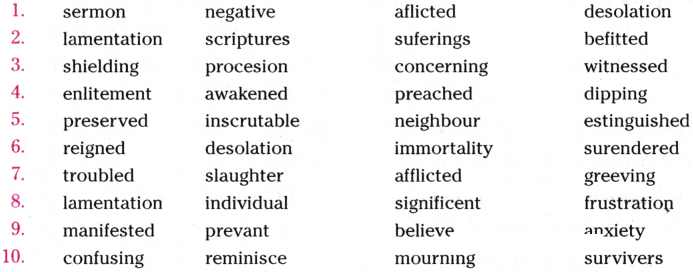
Answer:
- afflicted
- sufferings
- procession
- enlightenment
- extinguished
- surrendered
- grieving
- significant
- prevent
- survivors
Question2.Exercise ?
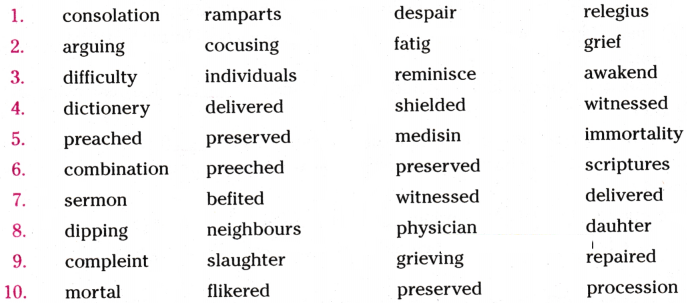
Answer:
- religious
- fatigue
- awakened
- dictionary
- medicine
- preached
- befitted
- daughter
- complaint
- flickered
Dictionary Skills
Question1.
Read the following dictionary entry of the word?
 Now, answer the following Questions using the information above
Now, answer the following Questions using the information above
Questiona).
What is the part of speech of the word depart?
Answer:
verb
Questionb).
What is the opposite of depart?
Answer:
arrive
Question2.
Read the following dictionary entry of the word?
 Now, answer the following Questions using the information above
Now, answer the following Questions using the information above
Questiona).
What is the part of speech of the word enlighten?
Answer:
verb
Questionb).
What is the adjective form of enlighten?
Answer:
enlightening
Question3.
Read the following dictionary entry of the word?
 Now, answer the following Questions using the information above
Now, answer the following Questions using the information above
Questiona).
What is the part of speech of the word extinguish?
Answer:
verb
Questionb).
What is the synonym of extinguish?
Answer:
put out
Question4.
Read the following dictionary entry of the word?
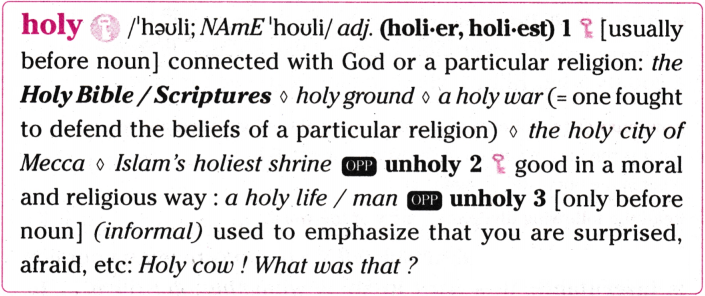 Now, answer the following Questions using the information above
Now, answer the following Questions using the information above
Questiona).
What is the part of speech of the word holy?
Answer:
adjective
Questionb).
What is the opposite of holy?
Answer:
unholy
Question5.
Read the following dictionary entry of the word?
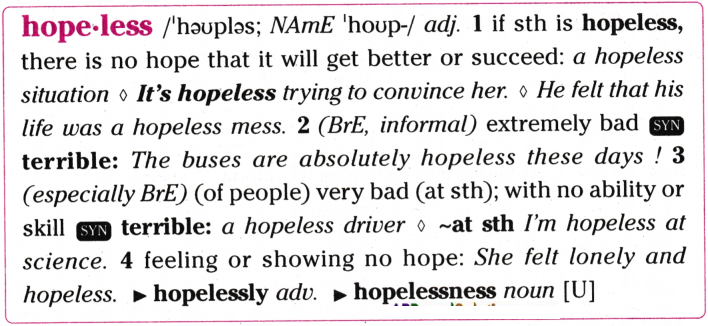 Now, answer the following Questions using the information above
Now, answer the following Questions using the information above
Questiona).
What is the synonym of the word hopeless?
Answer:
terrible
Questionb).
What is the adverb form of hopeless?
Answer:
hopelessly
Question6.
Read the following dictionary entry of the word?
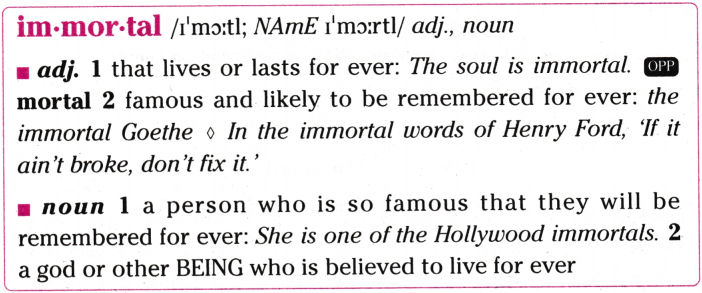 Now, answer the following Questions using the information above
Now, answer the following Questions using the information above
Questiona).
What is the part of speech of the word immortal?
Answer:
adjective
Questionb).
What is the opposite of immortal?
Answer:
mortal
Question7.
Read the following dictionary entry of the word?
 Now, answer the following Questions using the information above
Now, answer the following Questions using the information above
Questiona).
What is the part of speech of the word inscrutable?
Answer:
adjective
Questionb).
What is the adverb form of inscrutable?
Answer:
inscrutably
Question8.
Read the following dictionary entry of the word?
 Now, answer the following Questions using the information above
Now, answer the following Questions using the information above
Questiona).
What is the part of speech of the word joyful?
Answer:
adjective
Questionb).
What is the noun form of joyful?
Answer:
joyfulness
Question9.
Read the following dictionary entry of the word?
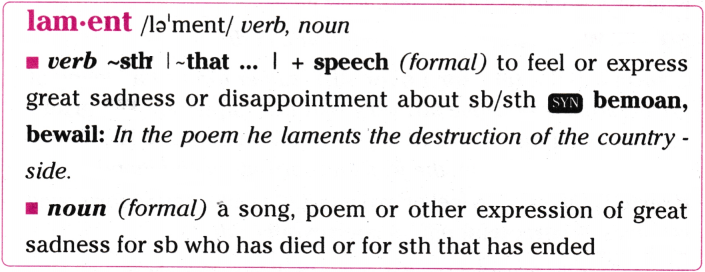 Now, answer the following Questions using the information above
Now, answer the following Questions using the information above
Questiona).
What is the part of speech of the word lament?
Answer:
verb & noun
Questionb).
What are the synonyms of the word lament?
Answer:
lament, bemoan
Question10.
Read the following dictionary entry of the word?
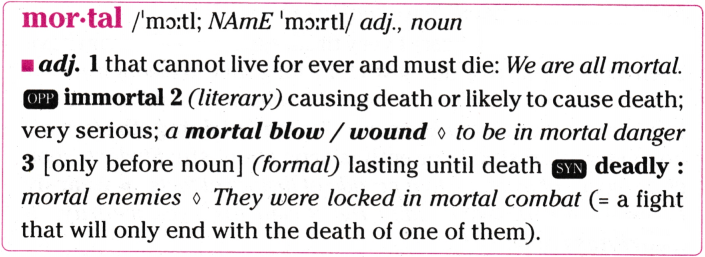 Now, answer the following Questions using the information above
Now, answer the following Questions using the information above
Questiona).
What is the opposite of mortal?
Answer:
immortal
Questionb).
What is the synonym of mortal?
Answer:
deadly
Question11.
Read the following dictionary entry of the word?
 Now, answer the following Questions using the information above
Now, answer the following Questions using the information above
Questiona).
What is the opposite of selfish?
Answer:
unselfish, selfless
Questionb).
What is the noun form of selfish?
Answer:
selfishness
Question12.
Read the following dictionary entry of the word?
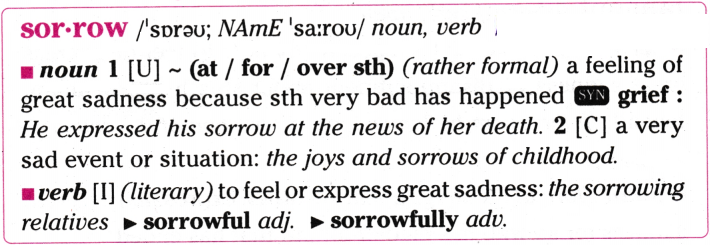 Now, answer the following Questions using the information above
Now, answer the following Questions using the information above
Questiona).
What is the synonym of the word sorrow?
Answer:
grief
Questionb).
What is the adjective form of the word sorrow?
Answer:
sorrowful
Question13.
Read the following dictionary entry of the word?
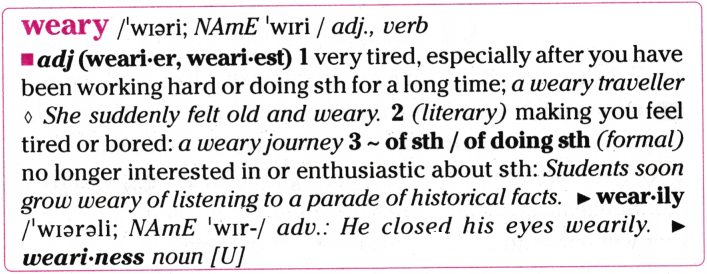 Now, answer the following Questions using the information above
Now, answer the following Questions using the information above
Questiona).
What is the part of speech of the word weary?
Answer:
adjective & verb
Questionb).
What is the noun form of weary?
Answer:
weariness
Classification of Words
Arrange the following words under correct hedings
Question1.
[seeds, alms, world, city, vessel, fruit, house, neighbourhood]?
| Things |
Places |
| 1. |
1. |
| 2. |
2. |
| 3. |
3. |
| 4. |
4. |
Answer:
| Things |
Places |
| 1.seeds |
1.world |
| 2.alms |
2.city |
| 3.vessel |
3.house |
| 4.fruit |
4.neighbourhood |
Question2.
[son, child, daughter, father, mother, adult, young, aged man]?
| Relations |
Phases in the life of a man |
| 1. |
1. |
| 2. |
2. |
| 3. |
3. |
| 4. |
4. |
Answer:
| Relations |
Phases in the life of a man |
| 1.daughter |
1.child |
| 2.son |
2. young |
| 3.father |
3.adult |
| 4.mother |
4.aged man |
Question3.
[potter, physician, a sick man, an aged man, master, prince, a monk, a funeral procession]?
| People |
The four sights Siddhartha had seen |
| 1. |
1. |
| 2. |
2. |
| 3. |
3. |
| 4. |
4. |
Answer:
| People |
The four sights Siddhartha had seen |
| 1.potter |
1.a sick man |
| 2. physician |
2.an aged man |
| 3.prince |
3.a funeral procession |
| 4.master |
4.a monk |
Question4.
contentment, fatigue, thirst, heat, love, pain, anger, disgust?
| Emotions |
Physical sensations |
| 1. |
1. |
| 2. |
2. |
| 3. |
3. |
| 4. |
4. |
Answer:
| Emotions |
Physical sensations |
| 1.contentment |
1.Pain |
| 2.Love |
2.heat |
| 3.anger |
3.thirst |
| 4.disgust |
4.fatigue |
Matching
Match the words / phrases given under Column A with their meanings given under Column B
Question1.
| Column - A |
|
Column - B |
| 1) chance upon |
|
A) affected by suffering, disease or |
| 2) at length |
|
B) to become mad |
| 3) afflicted with |
|
C) damaged with |
| 4) to lose ones senses |
|
D) come across by chance |
| |
|
E) after a long time |
| |
|
F) at lengthwise |
Answer:
- D
- E
- A
- B
Question2.
| Column - A |
|
Column - B |
| 1) sermon |
|
A) a speech |
| 2) valley of desolation |
|
B) religious or moral talk |
| 3) mortals |
|
C) a state ot high spiritual knowled |
| 4) enlightenment |
|
D) those bound to die |
| |
|
E) those that have no death |
| |
|
F) an area which is filled with deep |
Answer:
- B
- F
- D
- C
Question3.
| Column - A |
|
Column - B |
| 1) be composed |
|
A) went to |
| 2) lamentation |
|
B) to obtain something especially with difficulty |
| 3) procure |
|
C) affected by suffering, disease or pain |
| 4) inscrutable |
|
D) made or formed from several parts, things or people |
| |
|
E) expression of sorrow |
| |
|
E) expression of sorrow |
Answer:
- D
- E
- B
- F
Conversation
Question 1.
You have read the lesson The Sermon at the Benares.
Now write a possible conversation between you and your father regarding the journey of Siddhartha Gautama from prince to Buddha?
Answer:
Son : Hey Dad, 1 have just read a fascinating lesson called "The Sermon at Benares" about Siddhartha Gautamas journey from prince to Buddha. Have you heard about it
Father : Yes, Im familiar with the story of Siddhartha Gautama. Its quite remarkable, isnt it? What specifically caught your interest
Son : Well, I found it incredible how Siddhartha, despite being sheltered from the worlds suffering, was deeply moved by the sight of sickness, old age, and death. It prompted him to seek enlightenment. Can you imagine having everything and then choosing to leave it all behind to find answers to lifes deepest
Questions
Father : Absolutely, it takes immense courage and introspection to embark on such a profound spiritual journey. Siddharthas realization that material wealth and worldly pleasures couldnt shield him from the realities of human suffering is a powerful lesson for us all
Son : I was also struck by the moment when Siddhartha sat under the Bodhi Tree and vowed to stay until enlightenment came. Its inspiring how he remained steadfast in his determination despite facing numerous challenges and temptations along the way
Father : Yes, his perseverance and unwavering commitment to seeking truth are admirable qualities. Its a reminder that the path to enlightenment is often fraught with obstacles, but its the inner strength and resilience that ultimately lead to spiritual awakening
Son : And the part about Kisa Gotamis story, seeking medicine for her dead child, only to realize the universality of suffering and death, was quite poignant. It shows that suffering is a shared human experience, and ; true liberation comes from transcending selfishness and embracing compassion for all beings
Father : Indeed, the story of Kisa Gotami beautifully illustrates the Buddhas teachings on the nature of suffering and the impermanence of life. It emphasizes the importance of empathy and understanding in our interactions with others, especially during times of grief and loss
Son : Reading about Siddhartha Gautamas transformation into the Buddha has given me a lot to think about. Its a profound reminder of the power of self-discovery, compassion, and the quest for spiritual enlightenment
Father : Im glad you found it thought-provoking, son. Siddhartha Gautamas journey is a timeless tale that continues to inspire and resonate with people from all walks of life. Its a testament to the enduring relevance of his teachings in todays world
Son : Absolutely, Dad. Thanks for sharing your insights. Its always enlightening to discuss these profound philosophical concepts with you
Father : Anytime, son. Im always here to explore these ideas with you. Its what keeps our minds and spirits enriched
Question 2.
You have read the poem For Anne Gregory. Consider the societal pressures, particularly those faced by women, to conform to certain beauty standards. How do these standards affect individuals perceptions of themselves and their relationships? What is your opinion about it?
Write a possible conversation between you and your mother.
Answer:
I : Mom, Ive been thinking a lot about societal pressures, especially those that women face to conform to certain beauty standards: It seems like these standards can really affect how women perceive themselves and their relationships
Mother : Thats a very relevant topic, dear. Society often imposes unrealistic expectations on women, especially regarding their appearance. From a young age, girls are bombarded with images and messages about what it means to be beautiful
I : Exactly, and its not just about physical appearance - its about hair colour, body shape, skin tone, and so much more. Women are constantly comparing themselves to these unrealistic standards, which can lead to feelings of inadequacy and low self-esteem
Mother : Absolutely. Its heartbreaking to see how these standards can impact womens self-worth and confidence. They may feel like theyre not good enough unless they fit into a narrow definition of beauty, which is completely unfair and unrealistic
I : And its not just about how women see themselves - it also affects their relationships. If someone feels like they have to change their appearance to be loved or accepted, it can create a lot of insecurity ; and instability in their relationships
Mother : Thats true. Its sad to think that some people may only value women for their external appearance rather than their inner qualities and character. True love and acceptance should be based on who a person is, not what they look like
I : Absolutely, Mom. I think its important for us to challenge these societal norms and redefine what beauty means. We need to celebrate diversity and encourage women to embrace their unique qualities rather than trying to conform to impossible standards
Mother : I couldnt agree more, dear. As women, we should empower each other to love and accept ourselves just as we are, regardless of what society tells us. Its time to break free from these limiting beliefs and embrace our true beauty, inside and out
Question 3.
You have understood Bholis courage and self-assertion in rejecting societal norms
and standing up for herself, despite facing ridicule and discrimination.
Now write a possible conversation between you and your teacher regarding this?
Answer:
I : Good morning, Madam. 1 wanted to talk to you about the story we read, "Bholi". I found her character incredibly inspiring, especially in the way she stood up for herself despite all the challenges she faced
Teacher : Good morning! Im glad to hear that you found Bholis character inspiring. Yes, her courage and self-assertion are indeed remarkable considering the circumstances she was in. What specifically stood out to you about her actions
I : Well, I was amazed by how Bholi refused to conform to societal expectations, especially regarding her marriage. Even though she was pressured and ridiculed, she remained true to herself and spoke up against injustice
Teacher : Absolutely. Bholis refusal to marry someone she didnt respect or love, simply to satisfy societal norms, shows tremendous strength of character. Its not easy to go against the grain, especially in a society where conformity is highly valued
I : Exactly. And what struck me the most was how Bholi found her voice despite being labeled as unintelligent and unattractive. She defied those stereotypes and proved that inner strength and resilience matter more than outward appearances
Teacher : Thats a profound observation. Bholis journey highlights the importance of self-worth and inner resilience. Despite the ridicule and discrimination she faced, she never lost faith in herself or her abilities. Its a powerful reminder that our worth isnt determined by how others perceive us
I : Absolutely. Bholis story made me reflect on the importance of standing up for what we believe in, even when its difficult. Its a lesson i Ill carry with me, especially when facing challenges or discrimination in my own life
Teacher : Im glad to hear that Bholis story resonated with you on such a deep level. Its stories like hers that remind us of the power of resilience, courage, and self-assertion in the face of adversity. Thank you for sharing your thoughts on this remarkable character
I : Thank you, Madam, for guiding us through this story and helping us uncover its deeper meanings. Its been a truly eye-opening experience
Teacher : Youre very welcome. Its discussions like these that make teaching so rewarding. If you ever have more thoughts or
Questions about "Bholi" or any other stories we study, feel free to reach out
Diary Entry
Question 1.
Kisa Gotami, who had lost her son had been enlightened by the Buddha. After attaining the spiritual knowledge grief-stricken Kisa Gotami realised that there would be no use lamenting over the dead ones. She is now unattached and wise enough to draw out the lamentation and grief from her heart. She attained peace now. She wanted to write the diary entry of her feelings.
Imagine yourself to be Kisa Gotami and write your feelings as diary entry?
Answer:
20 May, 533 B.C.
Friday, 9.30 p.m.
Dear Diary,
How peaceful I am now! The flames of my grief have been extinguished by the realisation of spiritual wisdom. The waves of turbulent sea of misery have been suppressed by the enlightenment of soul. Losing a young son is heartbreaking and melancholic. I suffered a lot of agony, dolefulness and sombre. I felt emptiness of life after I lost my son. Life is desolated, dreary and purposeless. But Sakyamuni has brought my soul back. His preachings have meant a lot for me. If he had not been there, I would have still been wading through sinful, mystic, and mythic sea of mortal life
He has enlightened my heart. With his preachings I came to know that death is common to all. No one can avoid death. No one can be saved from death. Not from weeping, nor from grieving will anyone attain peace of mind. Moreover by lamenting over the dead one we will suffer a lot of pain and will be weak. We cannot attain peace of mind from grieving and weeping. With our lamentation the dead can not be saved. One who has drawn out the sorrow from his mind only can become free from sorrow. Thanks to Sakyamuni for enlightening my soul, for bringing peace to my mind.
Kisa Gotami
Question 2.
Bholis parents were dumbfounded for her courage, confidence and prowess. They were made speechless by her eloquent and fluent outburst. They were astonished how their stammering, nervous and timid simpleton Bholi has grown to be a girl of wisdom, self-reliance, and independence. Especially her mother was astounded at her astonishing transformation. She wanted to write her feelings as a diary entry.
Imagine yourself to be Bholis mother and write the diary entry. Assume her mothers name is Lakshmi?
Answer:
25 November, 20xx
Saturday, 9.30 p.m.
Dear Diary,
I am astonished, astounded and dumbfounded at our Bholis eloquent, fluent and unstammered outburst. I never expected that she can talk that. She is now grown up to be confident, wise, self-reliant and independent, I think it is all because of education she has got in that school. We must be thankful to the teachers and the headmistress. They have transformed our stammering, witless stupid simpleton into well-learned, well-mannered and empowered. The only thing we have done good for Bholi was to join her in the school. I can never be excused for I have not treated Bholi with love and affection. I have been unconcerned, indifferent towards her. I did not treat her as I had treated other children. I thought she was witless and ugly with pock-marks all over face and body. I have never bought new clothes for her. I used to give her worn out clothes of Champa. Her father made me realise our mistake. He told me that our carelessness, apathy and our unconcerned attitude were the causes of her fate
How intelligent she has grown up now! She has unmasked Bishambers greedy, contemptible and deceptive attitude. I am not downcast now for her marriage with Bishamber Nath ended in failure. Moreover I am very much happy because my girl now is self-reliant and intelligent. We now look for a capable young man who likes her for her education, abilities and skills but not for looks. I am now proud of my girl. From now onwards I keep loving her. Instead of showing hatred towards us she wanted to take care of us in our old age. How concerned was she towards us ! I would like to apologise to her. I wanted to show our affection towards her. Bholi, - no - no -1 dont call her Bholi - she is our Sulekha. Sulekha, excuse me.
Lakshmi
Letter Writing
Question 1.
Books in libraries are essential for education and knowledge dissemination. Libraries offer access to a vast array of books, providing opportunities for intellectual growth and personal enrichment. Through books, readers can explore new ideas, cultures, and perspectives, fostering empathy and understanding. Moreover, books preserve cultural heritage and collective wisdom, ensuring that future generations have access to the accumulated knowledge and insights of humanity.
Write a letter to your school librarian recommending new books for the library?
Answer:
[Your Name]
[Your Address]
[City, State, ZIP Code]
[Email Address]
[Phone Number]
[Date]
[Librarians Name]
[School Library Name]
[School Address]
[City, State, ZIP Code]
Dear [Librarians Name],
I hope this letter finds you well. As a dedicated advocate for the importance of reading and education, I am writing to recommend some new books for our school library, specifically targeted towards 10th standard students
Books play a pivotal role in shaping the intellectual curiosity and academic growth of students, offering them opportunities to explore diverse topics, expand their knowledge, and foster a love for reading. With that in mind, I believe that the following titles would be valuable additions to our librarys collection
"To Kill a Mockingbird" by Harper Lee
. This timeless classic offers profound insights into themes of justice, morality, and compassion, making it an essential read for students exploring complex social issues
"The Catcher in the Rye" by J.D. Salinger
. Salingers iconic novel provides a poignant portrayal of adolescence and identity, resonating with students as they navigate the challenges of growing up and finding their place in the world
"The Diary of a Young Girl" by Anne Frank
. Anne Franks diary offers a poignant and powerful firsthand account of life during the Holocaust, serving as a testament to the resilience of the human spirit and the importance of hope in the face of adversity
"1984" by George Orwell
. Orwells dystopian masterpiece explores themes of surveillance, government control, and individual freedom, prompting critical reflection on the nature of power and authority in society
"The Alchemist" by Paulo Coelho
. Coelhos allegorical tale of self-discovery and personal transformation inspires readers to pursue their dreams and embrace the journey of life with courage and resiliency
I believe that these books not only align with the academic curriculum but also offer valuable insights into the human experience, encouraging students to engage critically with literature and develop empathy and understanding for diverse perspectives
I am more than willing to assist in the acquisition and organization of these books in the library and look forward to seeing them become accessible to our students. Thank you for considering my recommendations, and I am eager to contribute to the enrichment of our school librarys collection.
Warm regards,
[Your Name]
Biographical Sketch
Question 1.
Write a biographical sketch of Dr. Sreedhara Somanath, the Chairman of ISRO using the following information.
Name : Dr. Sreedhara Somanath
Full Name : Sreedhara Panicker Somanath
Date of Birth : 7 July, 1963
Place of Birth : Alappuzha (Alleppey), Kerala
Parents : Father : Vedamparambil Sreedhara Panicker, a Hindi teacher Mother : Thankamma
Spouse : Valsala Kumari; Children : 2
Education : High School: St. Augustines High School, Aroor
Mechanical Engineering : TKM College of Engineering, Kollam Masters Degree in Aerospace Engineering from the Indian Institute of Science
Ph.D in Mechanical Engineering from the Indian Institute of Technology, Madras
Profession : Joined ISRO in 1985
Positions help : Served as the Project Manager of PSLV Project
Served as the Project Director for GSLV Mk - III
Under his leadership ISRO successfully launched the Chandrayaan - 3 Mission in 2023
The spacecraft launched on July 14, 2023 successfully fulfilled its mission on 23 August, 2023 at 6.04 p.m.
Awards : Space Gold Medal from the Astronautical Society of India (ASI);
Performance Excellence Award and Team Excellence Award from ISRO for his contributions to GSLV Mk - III?
Answer:
Dr. Sreedhara Somanath is the Chairman of ISRO. He is a prominent Indian aerospace engineer and rocket technologist. His full name is Sreedhara Panicker Somanath. He was born on 7th July, 1963. He was born at Alappuzha (Alleppey), Kerala. His father was Vedamparambil Sreedhara Panicker, a Hindi teacher. His mother was Thankamma. His wifes name is Valsala Kumari. He had two children. He had his high school education at St. Augustines High School, Aroor. He completed his Mechanical Engineering in TKM College of Engineering, Kollam. He took Masters Degree in Aerospace Engineering from the Indian Institute of Science
He did his Ph.D in Mechanical Engineering from the Indian Institute of Technology, Madras. He joined ISRO 1985. He served as the Project Manager of PSLV Project. He served as the Project Director for GSLV Mk - III. Under his leadership ISRO successfully launched Chandrayan - 3 Mission in 2023. The spacecraft was launched on July 14, 2023 and successfully completed its mission on 23 August, 2023 at 6.04 p.m. He received Space Gold Medal from the Astronautical Society of India (ASI). He received Performance Excellence Award and Team Excellence Award from ISRO for his contributions to GSLV Mk - III
Information Transfer
Question 1.
Study the following bar graph carefully and write a paragraph based on the information given in it?

Answer:
The bar graph illustrates the steady growth in the number of employees within a company over a five-year period, showcasing a positive trajectory in workforce expansion. Starting from 100 employees in 2017, the company experienced consistent annual increases, reaching 120 employees in 2018, 150 employees in 2019, 180 employees in 2020, and peaking at 200 employees in 2021. This upward trend indicates the companys resilience and capacity for expansion, reflecting its ability to attract and retain talent while meeting evolving business demands. The progressive increase in workforce size suggests a flourishing organizational environment, potentially driven by factors such as business growth, market demand, and strategic workforce planning. Overall, the data underscores the companys commitment to sustained growth and development, positioning it favorably for future opportunities and challenges
Question 2.
Study the following pie chart carefully and write a paragraph based on the information given in it?
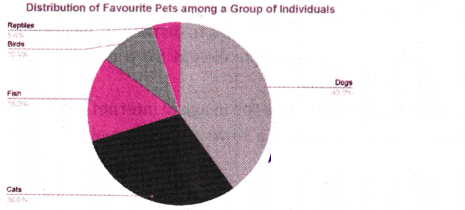
Answer:
The pie chart offers insights into the distribution of pet preferences among individuals, highlighting the varying degrees of popularity among different types of pets. Dogs emerge as the most favored choice, representing 40% of pet ownership, underscoring their status as beloved companions in many households. Following closely behind are cats, constituting 30% of pet preferences, reflecting their enduring appeal and widespread popularity as domesticated animals. Fish claim a significant but somewhat smaller portion at 15%, indicative of their popularity among hobbyists and enthusiasts. Birds and reptiles secure smaller slices of the pie at 10% and 5% respectively, suggesting a niche but devoted following among pet owners who appreciate the unique characteristics and care requirements of these animals. The pie chart illuminates the diverse array of preferences within the realm of pet ownership, reflecting the multifaceted nature of human-animal relationships and the varied roles that pets play in peoples lives
Question 3.
The chart below gives the percentage of social media users by age in India in 2020. Write a paragraph analysing the given information?
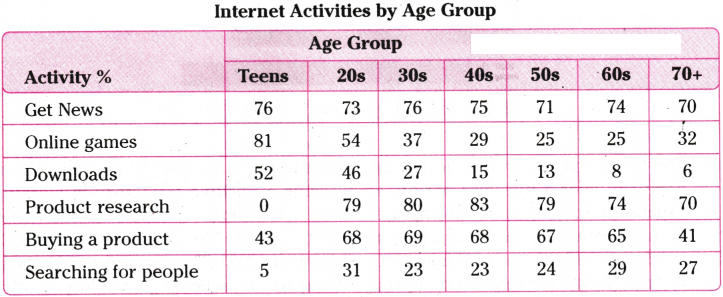
Answer:
The given table shows the internet activities done by certain age groups. The first age group in teens who do not do any product research. Instead, the teens indulge themselves in other activities more like online games, searching for news, doing online shopping etc. An average teen tends to look for entertainment on the internet more than something knowledgeable. Then come the people in their 20s. Their internet activity is drastically different from the teens, and they can be seen being indulged in more product research, news, shopping, searching for people etc. It can be seen through the given statistics that a persons mentality towards internet changes as they grow, and they tend to go for productive things to do there. The people in their 30s have a similar activity status to the 20s people except for a decrease in downloads, searching for people and online games
The given data reflects that the usage of internet is the need of the hour. It is not only bound to the age group be it a 10-year-old or an above seventy. Internet is a part and parcel of everyones life